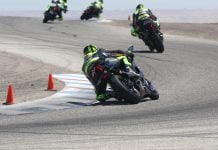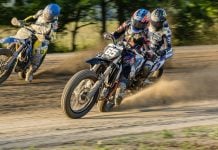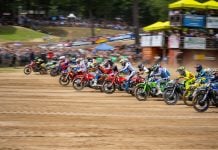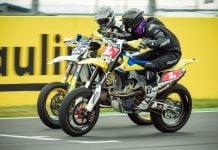OLIVIER JACQUE Olivier Jacque will make a welcome return to full time racing as part of Kawasaki’s new look MotoGP squad in 2007. The versatile Frenchman is one of the most experienced riders in motorcycling and can count the 250cc world championship in 2000 as the highlight of an outstanding career. Now 33, Jacque began racing at 17 and has been on two wheels ever since, progressing through the French national 125cc series, the 250cc European championship and then to the 250cc world championship with the Tech3 Yamaha Team. After winning the world title Jacque moved up to the premier 500cc class and then into the four-stroke MotoGP championship, his success rate only hampered by a series of injuries. Jacque came to the attention of the Kawasaki Racing Team as a wild card rider and his value as a test and development rider was quickly recognised, a role that has led to the rebirth of his race career in the factory team. As a wild card in the 2005 Chinese Grand Prix, Jacque scored Kawasaki’s best MotoGP result with a superb second place. This is just one of the 35 podiums, 17 pole positions and seven victories (in 250cc) that Jacque has scored in all classes of GP racing. Q: After two years as test rider for Kawasaki, what was your reaction when you were asked to become a full time race rider in MotoGP for the 2007 season? A: It was a dream come true, and in some ways it was a complete surprise, but a very pleasant surprise. Actually, I was hoping to have been a race rider with Kawasaki in 2006 but they selected a young guy instead and I can understand the reasons for that decision. At the end of the 2005 season my performances were not that strong so it made sense for Kawasaki to sign a young rider for the future. But now this race contract is like a new beginning in my career. Q: You stayed in the Kawasaki family as a test rider in 2006, but had you given up hope that one day you could return to MotoGP racing? A: Not really, but I was happy to accept the position of test rider which has been a very interesting experience. But I did become a little bored by not racing. I was doing many, many laps which was important for Kawasaki to improve the bike but this is not like the challenge of racing, which is a great personal satisfaction. And then, at the end of last season when I knew that Shinya Nakano was leaving Kawasaki I told the team that, if there was an opportunity, I wanted to race again, because I missed racing. Q: So you never lost the motivation to be back racing full time? A: No. I had a very strong motivation to race again, and a very strong desire that it should be with Kawasaki because I really like the way they work in MotoGP. Plus Kawasaki is a relatively new team to MotoGP and this project, now with the 800cc regulations, is very interesting. It was also an attraction to work with people I knew from my 250cc career, like Ichiro Yoda (Racing Director), who trusts in me. And the grand prix team is a young team, with a good outlook, this appealed to me. Q: Do you think your background as a test and development rider with Kawasaki will be of benefit now you are in the race team? A: Yes, this experience is an advantage for me because it will assist in better understanding the direction of the technical development of the bike. Q: And the new 800cc MotoGP class, what do you think? A: I like the concept, it’s an exciting new rule for MotoGP. Q: And what about riding style, is there any difference between the new 800cc bikes and the previous 990cc machines? A: I don’t think there is such a big difference in riding style between the bikes. When the 800cc machines first appeared there were actually many comparisons to the riding style of a 250cc two-stroke, but now I think this comparison is not so valid. At the beginning the relative lack of power with an 800, compared to a 990, is perhaps why some riders were comparing the bikes to 250s, but not anymore. Q: What do think is the potential of the 800cc Ninja ZX-RR and the Kawasaki team this year? A: I think the potential will be strong, and perhaps surprise a few people. When I first rode the 800cc ZX-RR in testing it was already a very good motorcycle and during the winter programme we have developed a strong base for this season. There have not been any major problems, but as always in racing it is difficult to make predictions, especially compared to your rivals before the season has started. What is certain is that we will have to continue to work hard to constantly improve the level of our own performance. Q: It appears there is now a lower level of electronic control on the new 800cc motors, compared to the more powerful 990s. What impact will this have on the riders? A: Yes, that’s correct. One outcome of this will be to make the competition closer between all of the manufacturers. And for the riders it will mean less electronics to deal with, and put more importance on rider input, especially over a race distance. Q: Your teammate this year is another French rider, the emerging MotoGP star Randy de Puniet. What do you think this all-French combination? A: For me this is a very good situation, and I have a good relationship with Randy. We have had some good times together socially, most recently in Japan. At the racetrack we have a strong working relationship, very professional. We can talk about the bike and compare our information and try to increase our speed together. It’s a friendly atmosphere, this is important. Q: How have you been preparing for the new season? A: As soon as it was confirmed that I would be a race rider in MotoGP this year I have been doing a lot of hard training over the winter; I want to show faith in Kawasaki for this opportunity. Mainly just a lot of fitness work in the gymnasium. Unlike many riders I don’t use bikes in my training, such as motocross or supermotard, I ride bikes enough during the grand prix season. Q: Long and exhausting pre-season test days are part of the MotoGP season. Is there a difference in the approach to testing and racing? A: In testing you have to use your experience and work time with the team in a different way, obviously to maximise the performance of the bike, and there is more time available. But during a grand prix weekend there are only two hours per day on the track before the race, so the focus is more on lap times and being ready for the race. It is more intense. Q: You have had a long and varied grand prix career, including winning the 250cc world championship in 2000. What are some of your personal highlights? A: The first would be winning the 250cc world championship, which was a very satisfying result for me. And the Chinese Grand Prix in Shanghai in 2005 was also a special moment, one that I could share with Kawasaki. It was a wet race, a lot of rain, and I finished second which was Kawasaki’s best result in MotoGP. And then signing on as a factory race rider with Kawasaki was a very happy moment for me. Q: In 2007 there are 18 races on the calendar, the longest ever GP season. What do think about this schedule? A: I’ll tell you at the end of the season, but for sure it is a lot of work! Q: Racing motorcycles has been your life, but if were not a professional rider, what would you be doing? A: I would like to open a sushi bar, because I love Japanese food. And I would probably be involved in the sport in some way, perhaps in a technical area with a team. Q: You live in London, what’s that like? A: I enjoy London a lot, although it can be quite cold in winter. And there are some good sushi restaurants there, and clubs to go to with my friends. There also are some great places, like Portobello, away from the tourist areas plus the theatre – I like musical comedy. I live near the King’s Road in Chelsea, the Sloane Street area, and there are always a lot of interesting things to do. Q: You have a new helmet design this year, is that of special significance? A: No, not really, there is no special meaning. I got together with my designer and we just wanted to make something very different for this season. Q: What are your personal goals for the 2007 season? A: Just to be racing at my top level, to get the best out of myself and the Kawasaki ZX-RR – that’s it. If I do that I’m sure some positive results will flow during the season.
Jacque Says 800cc MotoGP Bikes Require Less Electronic Rider Assistance
Jacque Says 800cc MotoGP Bikes Require Less Electronic Rider Assistance
© 2007, Roadracing World Publishing, Inc.





